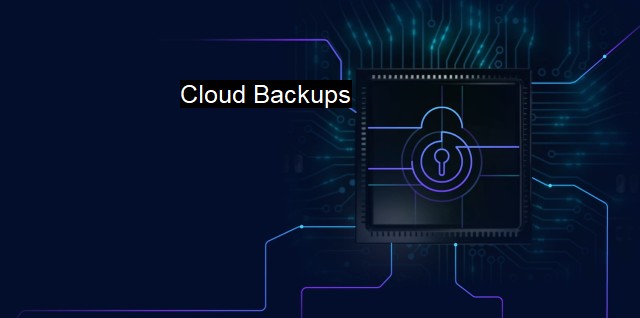What are Cloud Backups?
The Power of Cloud Backups: A Critical Tool for Cybersecurity and Antivirus Strategies
Cloud backup solutions provide a simple, efficient means of storing and protecting your data. our discussion would diverge towards what is commonly called "cloud backups." A cloud backup is a type of service through which cloud computing resources and infrastructure are utilized to create, edit, manage, and restore data, services, or application backups. This is accomplished over the Internet on a server, which is off-premises, typically hosted by a third-party service provider.Cloud backups, or online backups as they are known, can be utilized and scaled to match an organization’s particular requirements. The backups are automated and users can remotely access their data using a secure client log in application anytime. such backups offer accessibility options from any global location through internet-connected devices, like smartphones and laptops. Cloud backups operate in real time, which means your data or files are instantly secured on the cloud as soon as they are created.
Largely, these backup services depend upon robust cybersecurity mechanisms to shield data from potential threats. In a milieu where data breaches, hacker attacks and malicious threats are increasingly becoming a norm, cloud backup services are pivotal to ensure a safe and secure digital environment.
Talking about cybersecurity, industries globally are tightening their efforts to protect data from both internal and external threats. The external threats can be from cybercriminals or state-sponsored attacks that are continuously evolving. Unfortunately, the function of human error as a risk vector is an often understated security vulnerability that is much harder to monitor and control against. Cloud backups help to diminish that risk by ensuring any human-caused data incidents can be quickly rectified via restoration from the backup.
This concept of cybersecurity incorporates not just data encryption while at rest on the cloud servers, but during transit as well. This implies that if a cybercriminal managed to intercept your data during its journey to the Cloud, it would still remain unreadable since it would be encrypted.
These services also employ a less talked about aspect of cybersecurity, often termed as "redundancy." It's the process of virtual replication of data to ensure its preservation in case of technical faults or human glitches. Redundancy allows copies of data across different, separate servers, termed as ‘geo-redundancy.’ Using such degree of segregation, even if an entire datacentre went down, your data would still remain unharmed as it’s been mirrored elsewhere.
In the context of antivirus technology, cloud backups can add another defense layer. Many cloud backup systems come equipped with integrated antivirus programs that would sweep through all your files for any potential malware threat, before the backup process commences. By leveraging machine learning and AI, this software can notariate anomalies in files to shield from viruses, ransomware and other modern threats, thus notifying when there’s a security issue.
Your data and applications are the lifeblood of your business, and as such, deserve the highest level of protection. Cloud backups offer this, ensuring that even in the face of a cyber incident, your information can be swiftly restored and your business can maintain continuity. Strong measures that include intrusion detection and prevention systems along with high-level firewall systems are hereby crucial components of these cloud offerings.
Cybersecurity and antivirus software play a significant role in cloud backups. Their introduction has revolutionized digital security and is evolving with the increasing threat perceptions. With better security mechanisms and a safe footstep towards affordable cloud backup solutions, digital security will pave the way for entrepreneur confidence and user satisfaction. Cloud backups can provide this robust enterprise-level data protection facility - setting new benchmarks in data storage and safekeeping.

Cloud Backups FAQs
What is a cloud backup?
A cloud backup is a type of backup that stores data securely and remotely on a server or servers owned by a third-party cloud service provider. It is a secure and convenient way to ensure that data is backed up and easily accessible whenever needed.Why are cloud backups important for cybersecurity?
Cloud backups are essential for cybersecurity because they provide a way to store data securely offsite in case of a cyberattack or data breach. In the event that an organization's infrastructure is compromised, cloud backups can be used to quickly restore data and minimize the impact of the attack.How can I ensure the security of my cloud backups?
To ensure the security of your cloud backups, choose a reputable cloud service provider with strong security measures in place. Look for providers that offer advanced encryption, multi-factor authentication, and regular backup testing. Additionally, it is important to have strong password policies and to monitor access to the backup data.What role do antivirus programs play in cloud backups?
Antivirus programs play a critical role in cloud backups by providing an additional layer of protection against malware and other cyber threats. Antivirus software should be used to scan all files before they are backed up to the cloud to ensure that they are not infected with any viruses or other malicious software. Additionally, antivirus software should be used on all devices that access the cloud backups to prevent any potential attacks.| | A | | | B | | | C | | | D | | | E | | | F | | | G | | | H | | | I | | | J | | | K | | | L | | | M | |
| | N | | | O | | | P | | | Q | | | R | | | S | | | T | | | U | | | V | | | W | | | X | | | Y | | | Z | |
| | 1 | | | 2 | | | 3 | | | 4 | | | 7 | | | 8 | | |||||||